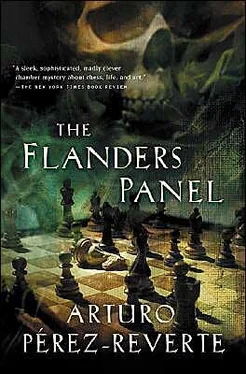“Are you sure?” asked Julia.
“Yes, I’m sure.”
“How do you know?”
“I just do.”
They were in Julia’s studio, in front of the picture, which was lit by every available light in the room. Cesar was on the sofa, Julia was sitting at the table and Munoz was standing before the Van Huys, perplexed.
“Would you like a drink?”
“No.”
“A cigarette?”
“No. I don’t smoke.”
A certain embarrassment floated in the air. Munoz seemed ill at ease. He was wearing a crumpled raincoat and had kept it firmly buttoned up, as if reserving the right to leave at any moment, with no explanation. He remained shy, mistrustful. It hadn’t been easy to get him there. When Cesar and Julia first put their proposition to him, the expression on Munoz’s face had required no commentary; he took them for a couple of lunatics. Then he became suspicious, defensive. They must forgive him if he seemed rude, but this whole story about medieval murders and a game of chess painted in a picture was just too bizarre.
And even if what they told him were true, he didn’t really understand what it could possibly have to do with him. After all, he kept saying, as if that way he could establish the necessary social distinctions, he was just an accounts clerk, an office worker.
“But you play chess,” Cesar had said with his most seductive smile. They had gone across the street to a bar and were sitting next to a fruit machine that deafened them at intervals with its monotonous jingle designed to ensnare the unwary.
“So?” There was no defiance in the reply, only indifference. “So do a lot of other people. And I don’t see why I…”
“They say you’re the best.”
Munoz gave Cesar an indefinable look. Julia interpreted it as meaning: Perhaps I am, but that has nothing to do with it. Being the best has no meaning. You could be the best, just as you could be blond or have flat feet, without feeling obliged to prove it to everyone.
“If that were true,” he replied after a moment, “I’d go in for tournaments and such. But I don’t.”
“Why not?”
Munoz glanced at his empty coffee cup and then shrugged his shoulders.
“Because I don’t. You have to want to do that kind of thing. I mean, you have to want to win…” He looked at them as if he wasn’t sure whether or not they would understand what he said. “And I don’t care whether I win or not.”
“So, you’re a theoretician,” remarked Cesar, with a gravity in which Julia detected a hidden irony.
Munoz held his gaze thoughtfully, as if struggling to find a suitable reply.
“Perhaps,” he said at last. “That’s why I don’t think I would be much use to you.”
He started to get up, but was prevented by Julia’s reaching out her hand and placing it on his arm. It was only the briefest of contacts, but it was invested with anxious urgency. Later, when they were alone, Cesar, arching one eyebrow, described it as “supremely feminine, darling; the damsel asking for help, though without overstating her case, and ensuring that the bird doesn’t fly the coop.” He himself could not have done it better; except that he would have uttered a little cry of alarm not at all appropriate in the circumstances. As it was, Munoz had looked down fleetingly at the hand Julia was already withdrawing and let his eyes slide over the table and come to rest on his own hands, with their rather grubby nails, which lay quite still on either side of his cup.
“We need your help,” Julia said in a low voice. “It really is important, I can assure you, important to me and to my work.”
Munoz put his head on one side and looked at her, or, rather, at her chin, as if he feared that looking directly into her eyes would establish between them a commitment he was not prepared to make.
“I really don’t think it would interest me,” he said at last.
Julia leaned over the table.
“Think of it as a game that would be different from any game you’ve played before. A game which, this time, would be worth winning.”
Cesar was growing impatient.
“I must admit, my friend,” he said, his irritation evident in the way he kept twisting the topaz ring on his right hand, “that I find your peculiar apathy incomprehensible. Why do you bother to play chess?”
Munoz thought for a while. Then he looked straight into Cesar’s eyes.
“Perhaps,” he said calmly, “for the same reason that you are homosexual.”
It was as if an icy blast had blown over them. Julia hurriedly lit a cigarette, terrified by the tactless remark, which Munoz had uttered unemphatically and without a hint of aggression. On the contrary, he was looking at Cesar with a kind of polite attention, as if, in the course of a perfectly normal dialogue, he was awaiting the response of a worthy conversational partner. There was a complete lack of malice in that look, Julia thought, even a certain innocence, like that of a tourist who, with the ineptness of the foreigner, unwittingly offends against local custom.
Cesar merely leaned a little towards Munoz, with an interested look on his face and an amused smile on his pale, thin lips.
“My dear friend,” he said gently, “from your tone of voice and the expression on your face, I deduce that you have nothing against what your humble servant here might or might not represent. Just as, I imagine, you had nothing against the white king or against the man you were playing a short while ago at the club. Isn’t that right?”
“More or less.”
Cesar turned to Julia.
“You see, Princess? Everything’s fine; no need to be alarmed. This charming man merely wished to explain that the reason he plays chess is because the game is part of his very nature.” Cesar’s smile grew brighter, kinder. “Something deeply bound up with problems, combinations, illusions. What’s a prosaic checkmate beside all that?” He sat back in his chair and looked at Munoz, who was still observing him impassively. “I’ll tell you: Nothing.” He held out his hands palms uppermost, as if inviting Julia and Munoz to verify the truth of his words. “Isn’t that so, my friend? Just a desolate full stop, an enforced return to reality.” He wrinkled his nose. “To real life, to the routine of the commonplace and the everyday.”
Munoz remained silent for a while.
“It’s funny,” he said at last, screwing up his eyes in a suggestion of a smile that never quite reached his lips, “but I suppose that’s exactly what it is. It’s just that I’ve never heard anyone put it into words before.”
“Well, I’m delighted to be the one to initiate you into the matter,” replied Cesar, not without a certain malice, and with a little laugh that earned him a reproving look from Julia.
Munoz seemed somewhat disconcerted.
“Do you play chess too?”
Cesar gave a short laugh. He was being unbearably theatrical today, thought Julia, as he always was when he had the right audience.
“Like everyone else, I know how to move the pieces. But as a game I can take it or leave it.” He gave Munoz a look of sudden seriousness. “What I play at, my esteemed friend, and it is no small thing, is getting out of the everyday checkmates of life.” He gestured towards both of them with one delicate hand. “And like you, like everyone, I have my own little ways of getting by.”
Still confused, Munoz glanced at the door. The lighting in the bar made him look weary and accentuated the shadows under his eyes, making them appear even more deeply sunk. With his large ears, sticking out above the collar of his raincoat, his big nose and his gaunt face, he looked like a thin, ungainly dog.
“All right,” he said. “Let’s go and see this painting.”
And there they were, awaiting Munoz’s verdict. His initial discomfort at finding himself in a strange place in the presence of a pretty young woman, an antiquarian of uncertain proclivities and a painting of equivocal appearance seemed to disappear as the game of chess in the painting took hold of his attention. For the first few minutes he had studied it without saying a word, standing quite still, his hands behind his back, in exactly the same posture, thought Julia, as that adopted by the spectators at the Capablanca Club as they watched other people’s games unfold. And, of course, that was exactly what he was doing. After some time, during which no one said a word, he asked for paper and pencil, and after a further brief period of reflection, he leaned on the table in order to make a sketch of the game, looking up every now and then to check the position of the pieces.
Читать дальше












